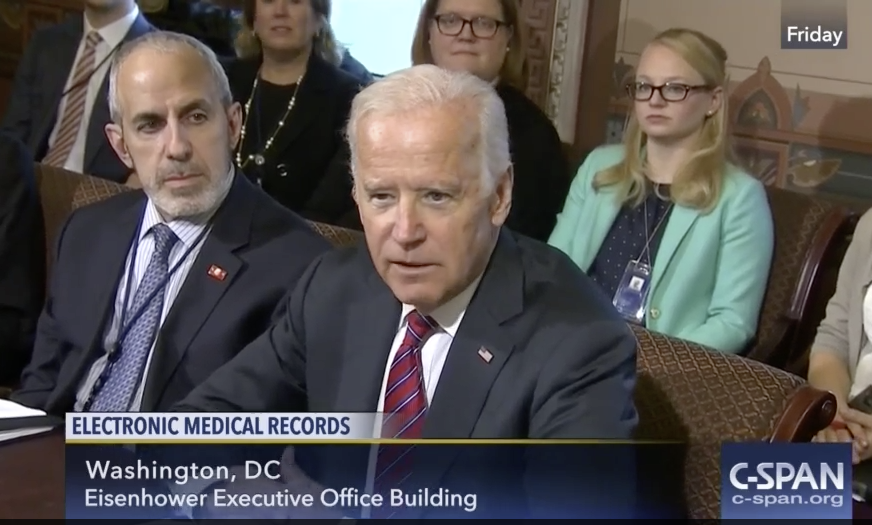Arthur Allen
See the following -
A 40-Year 'Conspiracy' at the VA
 Four decades ago, in 1977, a conspiracy began bubbling up from the basements of the vast network of hospitals belonging to the Veterans Administration. Across the country, software geeks and doctors were puzzling out how they could make medical care better with these new devices called personal computers. Working sometimes at night or in their spare time, they started to cobble together a system that helped doctors organize their prescriptions, their CAT scans and patient notes, and to share their experiences electronically to help improve care for veterans...
Four decades ago, in 1977, a conspiracy began bubbling up from the basements of the vast network of hospitals belonging to the Veterans Administration. Across the country, software geeks and doctors were puzzling out how they could make medical care better with these new devices called personal computers. Working sometimes at night or in their spare time, they started to cobble together a system that helped doctors organize their prescriptions, their CAT scans and patient notes, and to share their experiences electronically to help improve care for veterans...
- Login to post comments
Creating EHRs that Doctors Don't Hate
 It may be difficult to recall now, what with the ongoing Cerner deployment and recent challenges that had little to do with technology, but there was a time when the Department of Veterans Affairs was considered the gold standard for healthcare IT. VA was out front with the initial development in the 1970s of the VistA system, which would come to be widely recognized and frequently honored. Indeed, when VA was overhauled in the 1990s, VistA was the primary tool that enabled the success of new policies. Without question, much of the effectiveness and durability of VA's VistA can be attributed to the way it was developed, specifically to the collaboration between technologists and clinicians that defined the process.
It may be difficult to recall now, what with the ongoing Cerner deployment and recent challenges that had little to do with technology, but there was a time when the Department of Veterans Affairs was considered the gold standard for healthcare IT. VA was out front with the initial development in the 1970s of the VistA system, which would come to be widely recognized and frequently honored. Indeed, when VA was overhauled in the 1990s, VistA was the primary tool that enabled the success of new policies. Without question, much of the effectiveness and durability of VA's VistA can be attributed to the way it was developed, specifically to the collaboration between technologists and clinicians that defined the process.
- Login to post comments
Doctors Say Data Fees Are Blocking Health Reform
As they move to exchange patient information with hospitals and other health care partners, doctors are suffering sticker shock: The vendors of the health care software want thousands of dollars to unlock the data so they can be shared. It may take an act of Congress to provide relief...The exorbitant prices to transmit and receive data, providers and IT specialists say, can amount to billions a year. And the electronic health record industry is increasingly reliant on this revenue...
- Login to post comments
Government IT contractor sues VA over Cerner Deal
 CliniComp, a major Pentagon and VA electronic health records provider, is suing the Department of Veterans Affairs over Secretary David Shulkin's decision to offer a no-bid contract to Cerner to replace the agency’s VistA system. The suit brought Friday in the U.S. Court of Federal Claims charges that the VA violated federal contracting law by making the June announcement without first conducting market research or assessing the cost of the contract. It demands that the judge restrain the VA from awarding the contract to Cerner until the protest is resolved.
CliniComp, a major Pentagon and VA electronic health records provider, is suing the Department of Veterans Affairs over Secretary David Shulkin's decision to offer a no-bid contract to Cerner to replace the agency’s VistA system. The suit brought Friday in the U.S. Court of Federal Claims charges that the VA violated federal contracting law by making the June announcement without first conducting market research or assessing the cost of the contract. It demands that the judge restrain the VA from awarding the contract to Cerner until the protest is resolved.
- Login to post comments
Is The 1.5+ Trillion Dollar HITECH Act a Failure?
 Hopefully, the public statements made by President Obama and Vice President Biden will lead to a public debate over the monumental problems that the HITECH Act and proprietary EHR vendors have caused the American people. While the press continues to report the figure of $35 billion as the cost of implementing EHRs, that figure does not tell the entire story. Perhaps the next step is to provide accountability and transparency. That would start with firm numbers regarding the real costs of EHR implementations forced on an unprepared healthcare system by the HITECH Act.
Hopefully, the public statements made by President Obama and Vice President Biden will lead to a public debate over the monumental problems that the HITECH Act and proprietary EHR vendors have caused the American people. While the press continues to report the figure of $35 billion as the cost of implementing EHRs, that figure does not tell the entire story. Perhaps the next step is to provide accountability and transparency. That would start with firm numbers regarding the real costs of EHR implementations forced on an unprepared healthcare system by the HITECH Act.
- The Future Is Open
- Login to post comments
Obama and Biden Blast EHR Vendors for Data Blocking
 As they are winding their terms in office, President Barack Obama and Vice President Joe Biden dropped a stink bomb on the health IT industry. Speaking at different events on Friday, January 9th, the President and Vice President both criticized proprietary electronic health record (EHR) vendors as the primary obstacle to the success of their administration’s health care strategy. This is the highest level acknowledgment so far of the serious impact that “lock-in” EHR software vendors are having on America’s medical infrastructure and the ability of physicians to provide medical care.
As they are winding their terms in office, President Barack Obama and Vice President Joe Biden dropped a stink bomb on the health IT industry. Speaking at different events on Friday, January 9th, the President and Vice President both criticized proprietary electronic health record (EHR) vendors as the primary obstacle to the success of their administration’s health care strategy. This is the highest level acknowledgment so far of the serious impact that “lock-in” EHR software vendors are having on America’s medical infrastructure and the ability of physicians to provide medical care.
Open Source to the Rescue in Puerto Rico
 This week, a collaboration of private sector companies, the government, and not-for-profits hopes to deliver an EHR system to help Puerto Rico recover from Hurricane Maria, project leader Luis Belen told Morning eHealth's Darius Tahir. Belen, CEO of the non-profit, D.C-based National Health IT Collaborative for the Underserved, has been personally touched by the disaster: two of his aunts died because of the storm. The organization is coordinating with teams from HHS to bring a package of satellite phones, pre-loaded laptops, Amazon cloud storage, and an open-source software, OpenEMR+.
This week, a collaboration of private sector companies, the government, and not-for-profits hopes to deliver an EHR system to help Puerto Rico recover from Hurricane Maria, project leader Luis Belen told Morning eHealth's Darius Tahir. Belen, CEO of the non-profit, D.C-based National Health IT Collaborative for the Underserved, has been personally touched by the disaster: two of his aunts died because of the storm. The organization is coordinating with teams from HHS to bring a package of satellite phones, pre-loaded laptops, Amazon cloud storage, and an open-source software, OpenEMR+.
- Login to post comments
OSEHRA 2017: Open Source Becomes Mainstream in the Healthcare Industry
 One of the most exciting things about the OSEHRA 2017 Open Source Summit was to see so many leading edge open source health IT solutions, and to hear reports of the major strides they are making around the world. Our very own Editor-in-Chief, Roger A. Maduro gave a presentation on the state of open health IT. The room was absolutely packed, with standing room only. Maduro started his presentation by pointing out that during the recent HIMSS17 conference in Orlando, Florida, more than half of of the 300 sessions of the conference were based on open source solutions such as FHIR, Blockchain, Interoperability and the open/modular IT strategy being followed by Medicaid.
One of the most exciting things about the OSEHRA 2017 Open Source Summit was to see so many leading edge open source health IT solutions, and to hear reports of the major strides they are making around the world. Our very own Editor-in-Chief, Roger A. Maduro gave a presentation on the state of open health IT. The room was absolutely packed, with standing room only. Maduro started his presentation by pointing out that during the recent HIMSS17 conference in Orlando, Florida, more than half of of the 300 sessions of the conference were based on open source solutions such as FHIR, Blockchain, Interoperability and the open/modular IT strategy being followed by Medicaid.
- Login to post comments
VA to Employees: Zip your lips
 VA TO EMPLOYEES — ZIP YOUR LIPS ON EHRs: Some VA IT officials Arthur [Allen] has spoken to this week got emails instructing them to sign a non-disclosure agreement regarding the Cerner deal with the agency. The emails were directed to people who “have been selected to participate in the planning for an electronic health acquisition,” and it prohibits them from discussing “all data, information and software” related to the purchase.
VA TO EMPLOYEES — ZIP YOUR LIPS ON EHRs: Some VA IT officials Arthur [Allen] has spoken to this week got emails instructing them to sign a non-disclosure agreement regarding the Cerner deal with the agency. The emails were directed to people who “have been selected to participate in the planning for an electronic health acquisition,” and it prohibits them from discussing “all data, information and software” related to the purchase.
- Login to post comments
Why the VA Should Stick with VistA and Not Waste $16 Billion on an Attempt to Replace It
 This VA leadership lull provides an opportunity for reflection. Specifically, it’s worth asking while we have the time whether Cerner is the right path for the VA to take. While the decision may seem like a no-brainer to some, the VA’s situation is unique and arguably calls for a singular approach to both existing organizational issues and a major healthcare IT decision. Specific to the Cerner decision, what should the new VA secretary consider?
This VA leadership lull provides an opportunity for reflection. Specifically, it’s worth asking while we have the time whether Cerner is the right path for the VA to take. While the decision may seem like a no-brainer to some, the VA’s situation is unique and arguably calls for a singular approach to both existing organizational issues and a major healthcare IT decision. Specific to the Cerner decision, what should the new VA secretary consider?
- Login to post comments